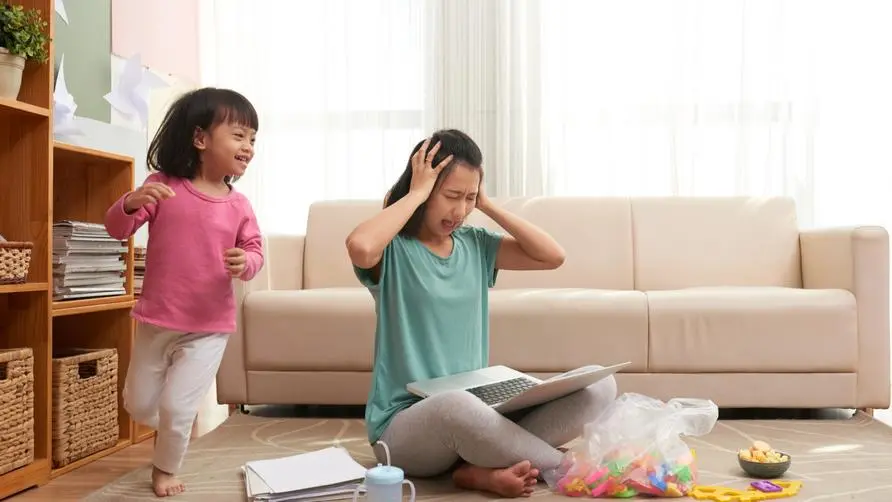Research: Commonly used "3C products" to calm noisy toddlers may only make children's tempers "more irritable"

Maybe it’s not a good idea to use your phone or tablet to calm noisy children? A recent study published in the authoritative journal “JAMA” confirmed that parents who use games and audio-visual content on electronic devices for a long time as a way to calm their children’s emotions may have the opposite effect - they will have a harder time learning to regulate their emotions, and will become irritable, anxious, and depressed in the future. I am afraid signs of resistance will become more obvious.
Study: Children who use electronic products to soothe their emotions are more likely to develop “irritable personalities” in the future
A research team from the University of Michigan conducted a study on 422 parents and 422 young children during the pandemic. The children were aged between 3 and 5 years old. Researchers analyzed the long-term emotional responses of young children when parents or caregivers gave them electronic devices. In the early days, the young children did feel calmer and more well-behaved because of the electronic devices; but six months after the study, the young children’s reactions began to change.
“After 6 months of experiments, it was found that young children began to show signs of ’emotional dysregulation.’” Jenny Radesky, the author of the study and currently a doctor of medicine at the University of Michigan, said that signs of emotional dysregulation include rapid changes in excitement and sadness, surrounding Rapid changes in perception and increased impulsive behavior, to name a few. The use of electronic devices to comfort young children is more likely to lead to emotional disorders than other soothing methods.
Radesky noted that the association was particularly strong among young children with preexisting ADHD tendencies, impulsivity, and bad temper, and that boys were more affected than girls. Research confirms that using a cell phone or tablet to try to calm a grumpy child may be effective in the short term; but in the long term, this approach will only make the child’s emotional state more unstable and deprive the child of emotional regulation and socialization. Ability.
When your children are noisy, don’t use your phone or tablet to deal with it! Expert: “4 training” helps young children regulate their emotions
Radesky said that she is actually a mother of two children, so she can understand parents using electronic devices to distract their children. “For example, it is expected to use tablets to soothe children when traveling or working. But the important thing is not to let electronic products become a regular soothing tool, which may have negative effects in the long term.”
Radesky also proposed solutions to children’s parenting problems, encouraging parents to try the following measures when they want to use electronic devices to comfort their children, which may be able to alleviate children’s unsettled emotions in the long term:
Training sensory skills: Young children have unique preferences for specific sensory inputs, such as rocking, hugging, jumping, listening to music or reading books, etc. Parents may wish to try a variety of safe soothing measures for senses such as hearing, vision, or smell, and train children to soothe their emotions after triggering specific actions.
Maintain rational thinking: Parents’ calm emotions and rational communication are the key to determining children’s emotions. The more calm parents can keep, the more children can receive the message that “emotions can be actively controlled”, which can help children connect language with current feelings.
Use color cues: When children are young, it is actually difficult to think about such an abstract and complex concept as “emotion”. Parents can try to “visualize” emotions, such as red representing anger, yellow representing anxiety, green representing calm, etc. They can make stickers or magnets for children to play with and learn the concepts of emotions.
Provide alternative behaviors: Children will show negative behaviors when they are angry or sad, such as beating the wall, graffiti, or simply rolling on the floor. At this time, young children need to be taught appropriate alternative methods. For example, if your hands may be injured when beating the wall, you can beat the pillow instead; graffiti on the wall will make it dirty. If you want to draw, you can use white paper to draw.
In addition, if children have to use electronic devices, Radesky recommends that parents should actively limit the time of use of electronic devices, so that children clearly know when they can use them, and the built-in applications must also have clear stop times, such as turning off the video. The platform’s “autoplay” function, setting the automatic closing function in the game, etc.
“The above solutions all help children understand themselves better and learn the ability to manage their emotions. Parents need to be patient and repeat it, and they also need to try to stay calm and not overreact to their children’s emotions. Children will be able to Parents’ attitudes develop emotional regulation skills that last a lifetime,” says Radesky.
Source:
Further reading:





